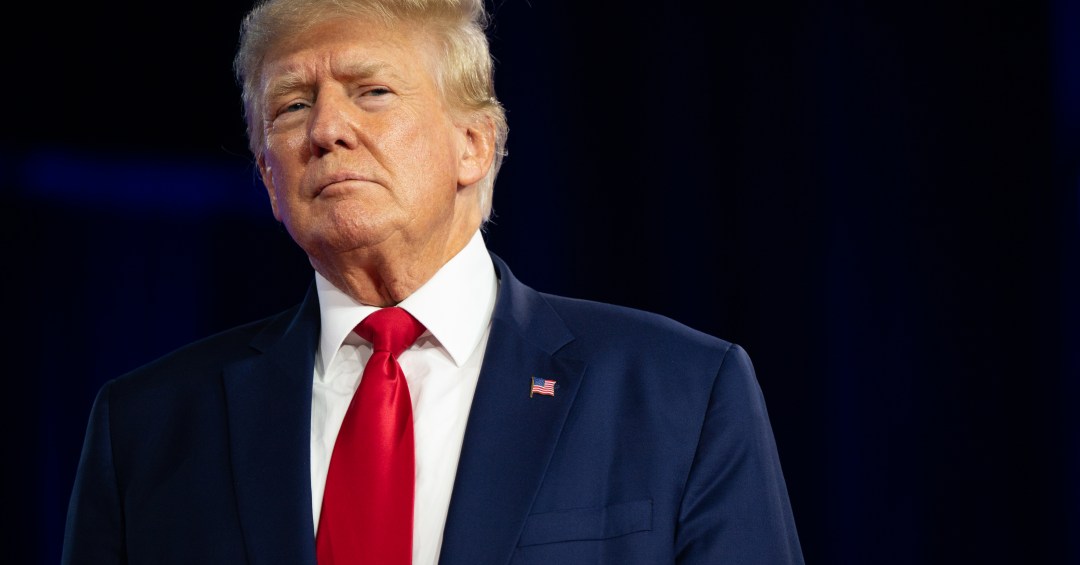The US Supreme Court has accepted a review of Trump's appeal to contest the Colorado primaries
The justices will decide in the trial whether to uphold and expand a Colorado court's decision that ruled in December that Trump could not run in the state, or to overturn that action. Because it's a Supreme Court ruling, the rule applies to other states — and, by extension, the entire country — where Trump's lead is contested at the ballot box.
Trump wants to run for the Republican Party in the US presidential election.
In the first session, they heard arguments for and against the Colorado decision. When thousands of people occupied the Capitol in Washington on January 6, 2021, a state court argued at the time that Donald Trump was participating in a riot.
In this case, according to the understanding of the Colorado judges, he violated a provision of the 14th amendment of the United States Constitution and, therefore, was not elected.
The former president's lawyers appealed the Colorado decision and the case reached the Supreme Court.
According to the assessment of the press and US agencies, the judges of the court, with a conservative majority, tended to support Trump.
The court's chief justice, conservative Justice John Roberts, said at the hearing that the consequences of ultimately upholding Colorado's ruling would be “very scary.”
According to Roberts, if Colorado's decision is upheld, other states will pursue their own disqualification procedures for Democrats or Republicans.
And only a few states decide the presidential election. It's a really scary outcome,” Roberts said.
In this report you will learn key things about the Trump case:
Donald Trump lost the 2020 presidential election to Joe Biden, but he refused to accept the result.
On January 6, 2021, Trump was still President and he gave a speech in Washington DC. After the speech, a crowd occupied the US Congress building (The building is called the Capitol).
Years later, the Washington-based group Citizens for Responsibility and Ethics filed a lawsuit in Colorado state court to bar Trump from running for office because of his participation in the January 6 episode.
Proponents of Trump's conviction claim that he participated in a rebellion and, therefore, his candidacy is a violation of the 14th Amendment to the US Constitution.
The text establishes that those who have participated as officials in rebellion or insurrection against the United States cannot return to public office.
Does this rule apply to presidents?
A key argument from Trump's lawyers is that this section of the Constitution does not apply to presidents.
They say there are details in the text (for example, “president” is not explicitly mentioned) that in practice rule does not mean presidents. Trump defenders have other arguments (see below).
How has the case progressed so far?
A Colorado trial judge accepted Trump's argument. She participated in a rebellion, but she understood that the text of the constitutional amendment did not apply to presidents.
The case that reached the Supreme Court came from Colorado, but there are other decisions on the same issue in other states:
- In Maine, the Secretary of State, a Democrat, also decided to remove Trump from the ballot.
- In Illinois, a retired judge who held the role of auditor of the Board of Elections recommended keeping Trump on the ballot until the courts decide, but said he thought the former president could not run (Judge. Republican).
Trump's Other Arguments
Trump's main defense is that the rule doesn't apply to presidents, but lawyers have other arguments:
- This is an ambiguous provision in the Constitution and should be clarified by Congress, not by the courts.
- The January 6, 2021 attack on Congress was not an insurgency, as it was at one location and had almost no firearms or other aspects of insurgency.
- Trump did nothing but exercise his right to free speech protected by law in the United States.
But was the rebellion prosecuted?
There is another argument in favor of Trump: to determine whether he participated in the rebellion, there should be a legal process in which his rights are observed, which did not happen – in practice, the Colorado court decided that the article was valid. Presidents.
This section of the Constitution is rarely cited and the Supreme Court has never ruled on any case related to this section.
Trump's case is historic and has raised expectations that new legislation will be created.
Isn't this a political judgment?
Members of the Democratic Party want Trump barred from running, while those in the Republican Party say the former president believes there is a campaign against him.
The US Supreme Court has six justices appointed by Republican presidents (three of them by Trump).
The other three were nominated by Democratic leaders.
There are conservative legal experts who say the text of the Constitution is plain and simple and should bar Trump from running.
Even among supposedly progressive judges, there are doubts: All members of the Colorado Supreme Court were appointed by Democratic governors, and 3 out of 7 voted in favor of the former president.
What are some possible outcomes?
Judges' decisions can be classified into one of three categories:
- The court will convene Affirm the decision of the Colorado Court.
- The court may decide Trump cannot be disqualified from the election. The procedural decision is the end of the lawsuit in Colorado and dozens of other lawsuits that are in early stages across the United States.
- Supreme Court can Don't make the final decision. This will keep many processes alive across the country.
The Trump campaign says it has filed more than 60 similar lawsuits, but most were dismissed for procedural reasons. If there is uncertainty about the Supreme Court's decision, there may be more cases.

“Internet evangelist. Writer. Hardcore alcoholaholic. Tv lover. Extreme reader. Coffee junkie. Falls down a lot.”






:strip_icc()/s01.video.glbimg.com/x720/12245248.jpg)
More Stories
Trump’s plan to affect Brazilian immigrants in the US
UK begins detaining migrants deported to Rwanda
UK to start arresting migrants being deported to Rwanda